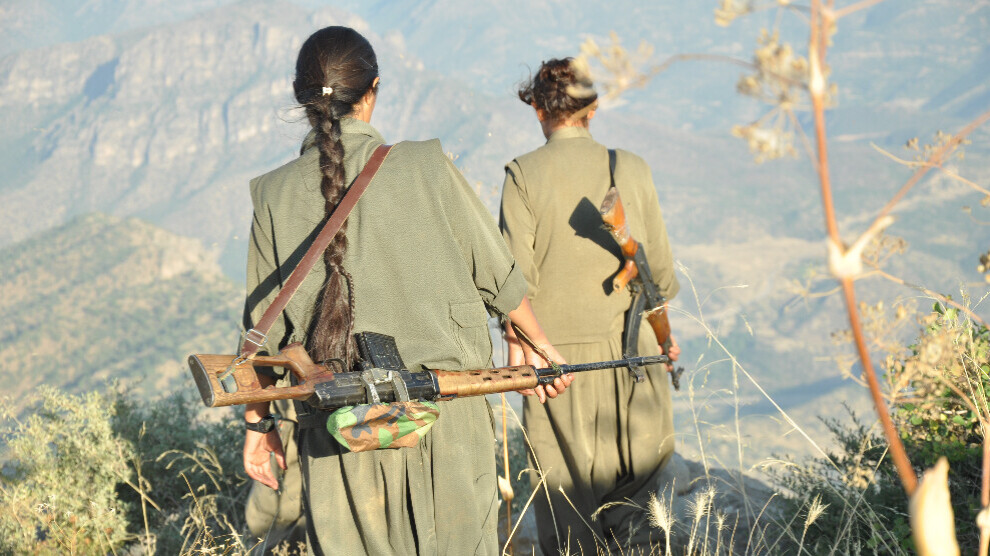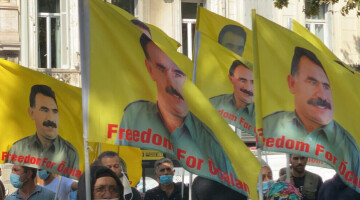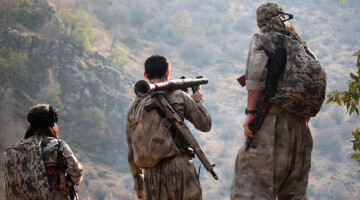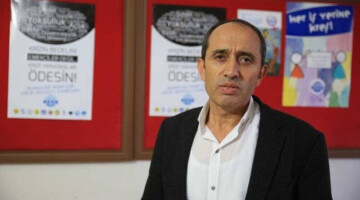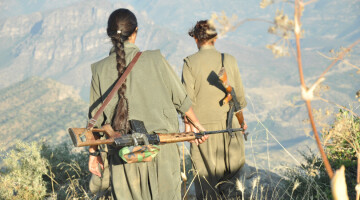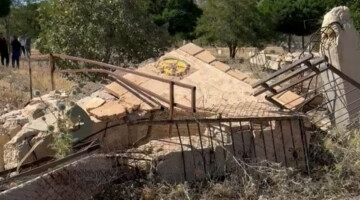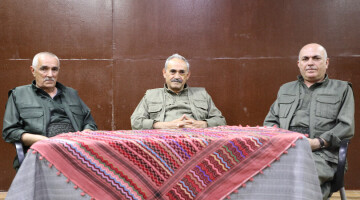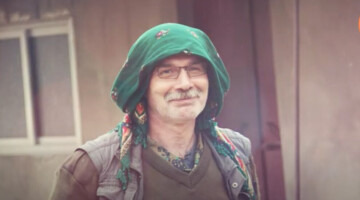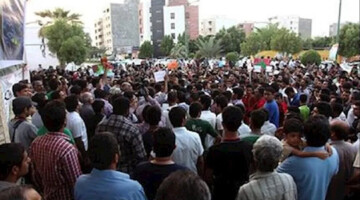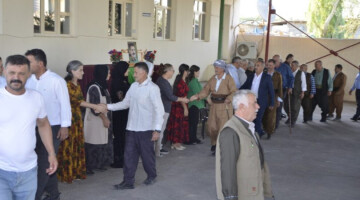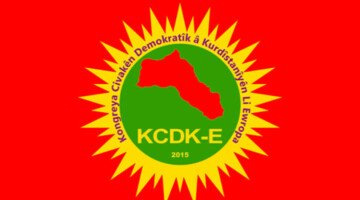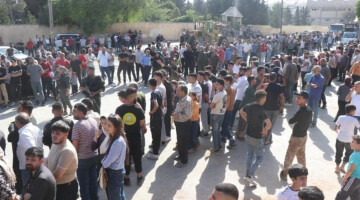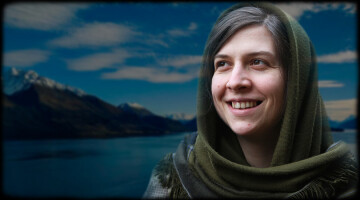On February 27, Kurdish leader Abdullah Öcalan made a historic call that caught the attention of the entire world. In his call, he stated that in order to shift the Kurdish issue from a grounds of violence to one of democratic politics and law, the first condition was for the PKK to convene a congress, dissolve itself, and lay down its arms.
In response to this call, the PKK leadership declared a ceasefire effective from March 1.
This sparked heated debate: some were surprised, some were moved, some manipulated the situation, and some tried to understand. In short, everyone had something to say. In particular, every official from every side spoke on the issue. Of course, it was a topic that needed to be discussed. In fact, it had to be discussed.
ANF talked to a group of guerrilla fighters about the process.
First, we got acquainted. One was a tall, dark-haired Arab girl named Sena Minbic. Another was a Kurdish girl from Khorasan with leaf-green eyes named Binevşa Berwar. The third guerrilla fighter was Siyaroj Gabar, a cheerful man from Şırnak.
After the meeting stage, we decided to continue our conversation outside. We sat in a circle under trees whose buds had just begun to bloom. And so began my conversation with the guerrilla fighters.
How did you meet Abdullah Öcalan’s February 27 call?
Siyaroj Gabar: Everyone responded to the call in their own way. This was true for us as well. Some of us were moved, some were surprised, and some regretted that Leader Apo (Abdullah Öcalan) had not been understood in his time. But there was one thing we all shared: we all felt joy at having received news from Leader Apo. We had been wondering about him for years due to the inhumane isolation he had been subjected to.
While the whole world was paying close attention to what Leader Apo had said in his call, the guerrilla comrades were focused on the photo of the Leader. Seeing his photo evoked indescribable emotions in all of us.
Of course, the call was a very brave and historic one. Those who understand this call and implement it correctly will achieve great success in human history. Those who do not understand it, however, will not be able to escape becoming victims of the Third World War.
Did you expect such a call from İmralı?
Actually, it would be strange not to expect such a call from İmralı because Leader Apo has been pursuing such a goal since the 1990s. This process, which was announced to the public as the “Call for Peace and Democratic Society” but can also be defined as a process of democratic transformation and restructuring, is the result of the 50-year struggle of Leader Apo and our movement.
The Kurdish people have put tremendous effort into this struggle. There is the 41-year-long war of the guerrillas and the 26-year-long resistance in İmralı. In fact, this call is not a new one; Leader Apo has made similar calls many times before. Peace groups went to Turkey in response to our leader's call, but they were arrested. Ceasefires were declared many times, but the response to these ceasefires was an approach aimed at deepening the war of total annihilation.
Once again, following Leader Apo's call, guerrilla forces in active battlefields (both in 1999 and 2013) withdrew from the battlefields, and the Turkish state and its special war clique took advantage of this vacuum by building dams, destroying forests, and establishing military outposts in Kurdistan. At the same time, they played with the moral values of the Kurdish people, promoting assimilation, prostitution, and drug use.
The Turkish state has squandered all opportunities for peace by responding to every call for peace with a conspiratorial attitude, exploiting the situation, and undermining the possibility of peace through its policies of destruction. We hope that this time will be different.
In short, our leader's pursuit of peace did not surprise us. However, Bahçeli's loud demands that “isolation be lifted, Öcalan be allowed to come to parliament and speak” were surprising. Bahçeli's stance is a subject that requires a very deep investigation into its causes and consequences.
What has changed for you since the call?
What has changed for us is that we question ourselves more. How well do we understand Leader Apo? How much have we strengthened his hand? How many of the hundreds of social projects he outlined in his defense have we implemented? There are many issues that need to be questioned and resolved, both on our side and on the side of the state.
We have done questioning on our own side during this process. We are discussing other revolutionary experiences and the processes of reconciliation, peace, and negotiation. We are discussing some agreements reached by the IRA, ETA, South Africa, and Oslo, and we want to draw conclusions. We are rereading the leader's defenses. We are discussing the issues of being a militant for both war and peace.
But whatever we discuss, our fundamental measure is focused on the freedom of our leader because, for us, peace means reuniting with our leader.
What does Leader Apo aim for with his Call for Peace and Democratic Society?
Sena Minbic: When one understands what Leader Apo wants to do, looking at it more concretely, they will see that he is intervening in the course of the Third World War. The issue has long since transcended national extinction. The issue is a matter of humanity. Our leader, who has recreated the Kurdish people, brought the peoples of the Middle East together, and sparked a women's revolution, now seeks to unite all of humanity and ensure that we live in peace.
So, do you think the PKK has achieved its goals?
It is important to understand what we mean by “goals.” The PKK has long-, medium-, and short-term goals and objectives. In general terms, our goal is for humanity, women, and nature to be able to live according to their true essence.
The PKK's oldest goal was to prove the existence of the Kurdish people; it proved it. Its goal was to open up areas of struggle; it opened them up. Its goal was to rise up against the denial of women; it did so. Its goal was to bring peoples together in an environment of shared democracy and equality; it did so. Thousands of such achievements can be mentioned.
Those who study the history of the PKK will see that the PKK has already achieved all its goals and completed its mission.
Could the PKK have achieved these goals through means other than armed struggle?
If we weren't facing a state with such a rigid mindset like Turkey, we would have achieved them. In another part of the world, the PKK's demands could have been perceived as projects for humanity, democracy, women's freedom, and ecology. But when it comes to the Turkish state, which is obsessed with division, denial, and assimilation, armed struggle became inevitable.
The PKK is primarily a response to the massacres in Geliyê Zîlan, Dersim, and dozens of others that we cannot name. It fought because it refused to accept the denial of the Kurds, one of the ancient and most deeply rooted peoples of the Middle East, and the denial and fragmentation of the Middle Eastern culture and identity that has been nourished by this culture, rooted in it, and later universalized.
And if the PKK had not fought, we would not be able to discuss peace today.
Some circles say that the goals have been reduced to a minimum level in the historic call. What do you think about this?
Binevşa Berwar: Yes, many circles may think that the goals for resolving the Kurdish issue have been reduced in the call. However, those who know Leader Apo see the truth. In reality, there is an expansion of goals that encompasses all of Turkey and even the Middle East. A solution for everyone is the primary focus, which is entirely related to the intuitive intelligence and political foresight of our leader.
What are your thoughts on disbanding and disarming? Do you think conditions for this to happen are available?
Not only disbanding and disarming, but everything related to this process is possible with a serious approach. Without a serious approach and without correctly reading the global and regional context, it is inevitable that this process will end in defeat.
We do not view self-dissolution as an end, but rather as the beginning of a new era. We do not consider disarmament as surrender, but rather as a more comprehensive struggle. Moreover, there are no negotiations; in this sense, struggle is indispensable for us under all circumstances.
In conclusion, this transformation should have taken place years ago. The fact that it has not happened is entirely due to the Turkish state's lack of seriousness. Therefore, it is important that we now embark on this process in the manner and at the pace envisaged by our leader.
So are you hopeful this time? Will this process lead to lasting peace?
Being hopeful is related to being happy and safe. Are we safe? No. Just yesterday, we received training on how to take precautions against chemical attacks, how to wear masks, and how to use oxygen and gas masks. Every day, warplanes and reconnaissance aircraft fly overhead. Thousands of howitzers and mortar shells are fired at some of our areas every day.
Just today, we received news that two of our female friends, Besê and Mîtra, had been martyred in chemical attacks. The Turkish state is currently saying to us: 'I will drop tons of bombs every day, I will drop chemicals, and you hold your congress under these conditions. I will kill you with all kinds of weapons, but you lay down your arms. Gather and dissolve yourselves, but I will not even show the power to convene a peace commission in parliament.'
In short, people only take those who take serious steps seriously. In this regard, we trust only our leader. We are bound only by the words of our leader. For us, the main thing is to struggle under all circumstances. We are not hopeless, but we are not unvigilant either. Trust cannot be built unless words and actions are consistent.
A few months ago, everyone was talking about them, the guerrillas. Some believed they were finished, others believed they should surrender and hand over their weapons. Some believed they should be held accountable by the state. Everyone was talking without asking, “What are they thinking?” Because in times like these, it is easy to talk, but difficult to understand.”
We saw that, despite everything, the guerrillas remained steadfast, calm, and patient. We realized once again that they have a historic responsibility and a reality that transcends demagoguery. We thanked the guerrilla fighters for the interview and left.

